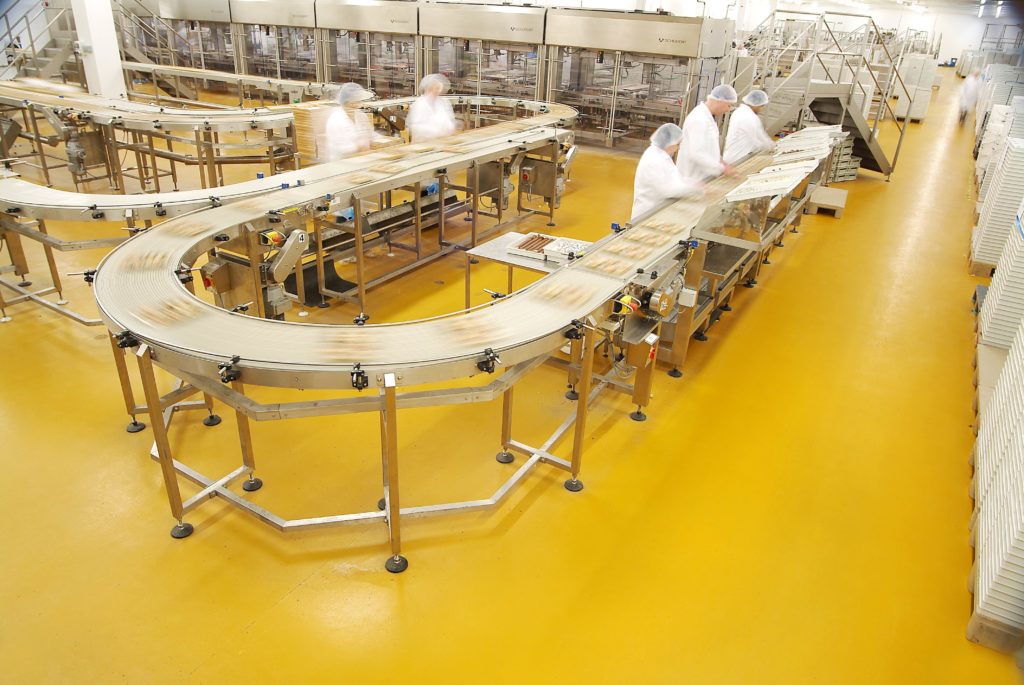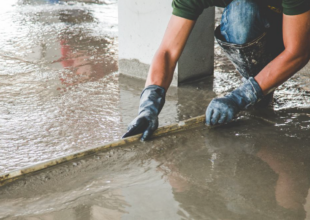
Flooring Factors for the Food & Beverage Industry
The food industry is a vast, multifaceted and complex world that requires a lot of people with a lot of specialisms in a lot of different fields.
- Food factory flooring needs to be carefully considered in order to minimise contamination risks
- Food and beverage production subjects the floor finish to a number of challenges
- Several key properties are vital to ensure that a floor maintains a hygienic, easy-to-clean surface
One of the sector’s inherent difficulties is the fact that every facility needs to meet very strict hygiene standards while simultaneously being able to manufacture significant quantities of products to very demanding deadlines.
This combination of challenges means that each component of a production and processing facility must be carefully assessed to ensure that it will be up to the task at hand. Failure to do so can mean foodborne illness outbreaks, unmet quotas and unsafe operating conditions – all of which can lead to costly recalls, serious litigation issues and irreparable business damage.
These concerns are as true for the smallest microbrewery or baker as they are for the largest soft drinks manufacturer and multi-national food exporter.
The potential for contamination within production spaces to spread rapidly with dire consequences was exemplified recently by an outbreak of listeriosis cases across Europe due to tainted salmon. The outbreak, which affected consumers in three countries, was linked to a single processing facility in Poland.
Hygiene Starts from the Ground Up
Getting the floor area right is an important part of making sure that the site will be able to function hygienically, safely and efficiently for the long term.
While often overlooked, the floor is the platform on which all the equipment is based, all the staff move around and on which all of the produce is made and stored. Should dangerous bacteria be able to infiltrate the floor area then it could quickly lead to produce being contaminated and ruined.
The most common cause of unhygienic flooring is when cracks and gaps appear in the finish, as this provides dirt, grime and dangerous microbes with a hard-to-clean hiding place. From here bacteria can spread throughout the site, crossing between areas on the soles of shoes or on the wheels of equipment.
To protect against this, floors in food and beverage production spaces should be seamless and impervious, with coving running around the edge of the floor. These properties will help the cleaning regime to quickly and easily wash the area without having to worry about dirt and grime getting trapped in the floor finish.
The floor must also be robust enough to maintain these benefits despite the impacts, chemicals, traffic, abuse and wear inherent to a busy industrial facility. If any of the realities of day-to-day operations cause the floor to crack, crumble or otherwise fail then it will no longer be able to facilitate a clean working environment.
Incorporating stainless steel drainage into the floor plan is vital to ensuring that contaminants on the floor finish are properly removed. There are a few things to bear in mind when designing the drains, including making sure that they are large enough to cope with the site’s workload without blocking and that the floor is sloped towards the drains to stop liquids ponding and stagnating. To ensure that the floor’s seamlessness isn’t compromised, the coating must run up to the drains without any gaps.
Cutting Edge Clean Flooring
The importance of the above flooring characteristics is highlighted by the fact that they are all criteria that must be implemented as part of an effective HACCP food safety program.
Flowcrete UK has developed its HACCP International certified Flowfresh flooring range to provide food & beverage producers with floors that go above and beyond even this benchmark of flooring hygiene.
Not only does the polyurethane resin chemistry of every Flowfresh floor make for highly durable, easy to clean floor coatings, but every system in the range has been enhanced with the silver-ion based bactericidal agent Polygiene®. This formulation has been tested to the ISO 22196 standard for antibacterial effectiveness and was proven to drastically reduce the number of bacterial cells on the floor’s surface.
The use of natural silver is useful for another reason – as it does not add to the problem of chemicals and drugs inadvertently creating more and more antibacterial-resistant pathogens.
Flooring that Fits the Task
As no two food businesses are completely alike, neither are their floors. To make sure that it provides a clean, safe and reliable platform for an extended period of time, the floor area should be as specific to the site as every other item of production and processing equipment.
Flowcrete UK has been making floors for the food industry for over three decades, and during that time its team of experts has encountered every problem that a producer is likely to throw at the floor. From ingredients that eat into the finish, ovens that blast super-heated air, punishing production schedules, exceptionally contamination sensitive spaces and everything in between, Flowcrete has made a floor that will fit the task at hand.
This is why the Flowfresh range is currently supporting production at food facilities all over the world, ranging from McVitie’s, The Macallan, Brooklyn Brewery, Unilever, Bannister Downs Dairy, Thorntons and White Rabbit to name just a few.
To find out how to create a floor tailored to the specific demands of a food and beverage site, contact Flowcrete UK’s resin flooring experts today on uk@flowcrete.com.
Credits
Our latest news
For the latest news on FeRFA, its members and the industry.




